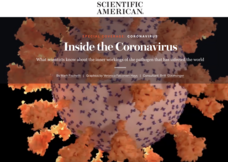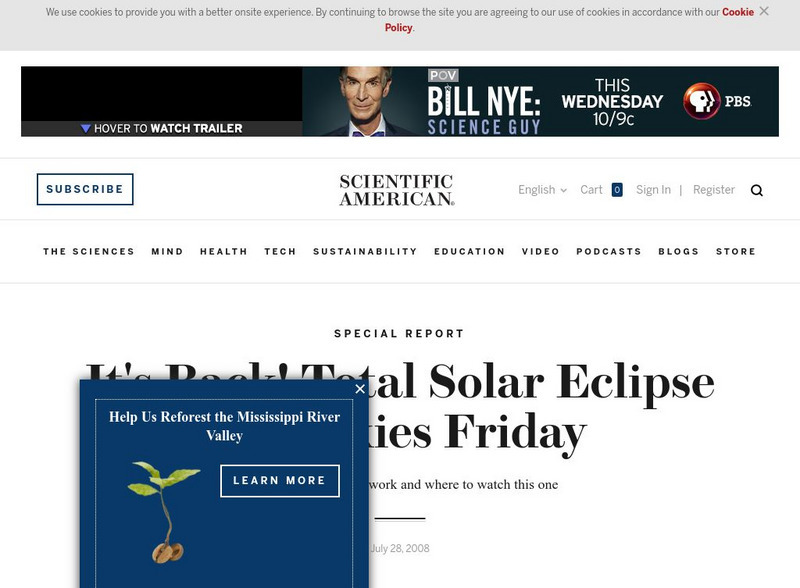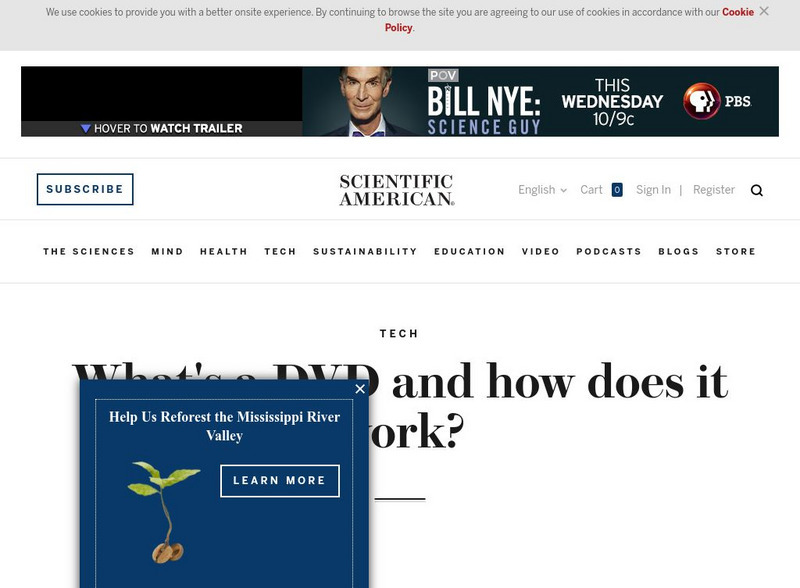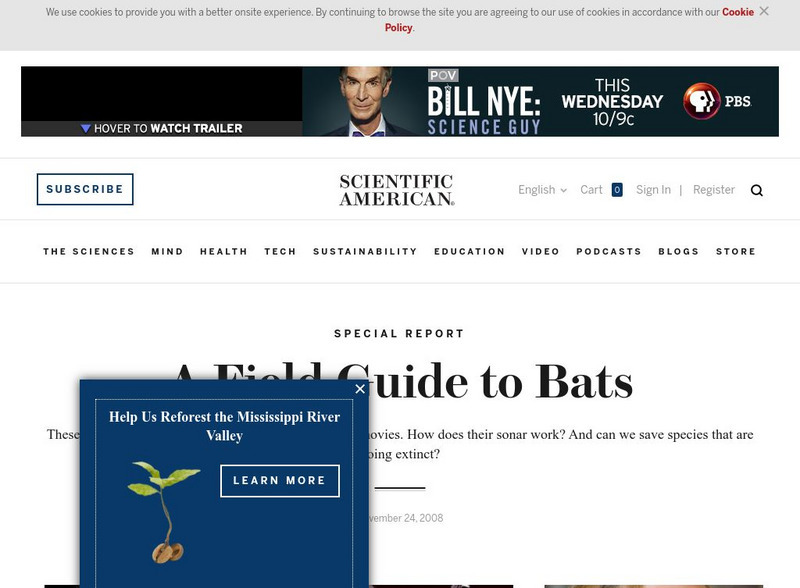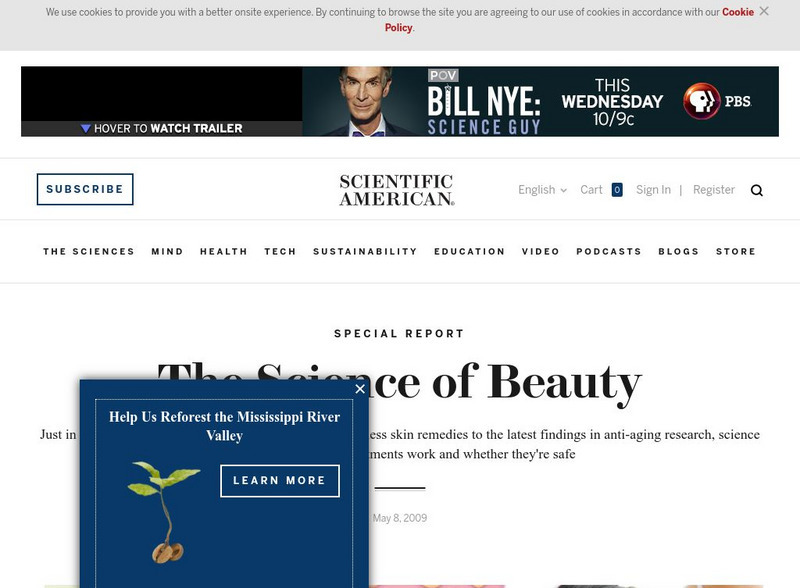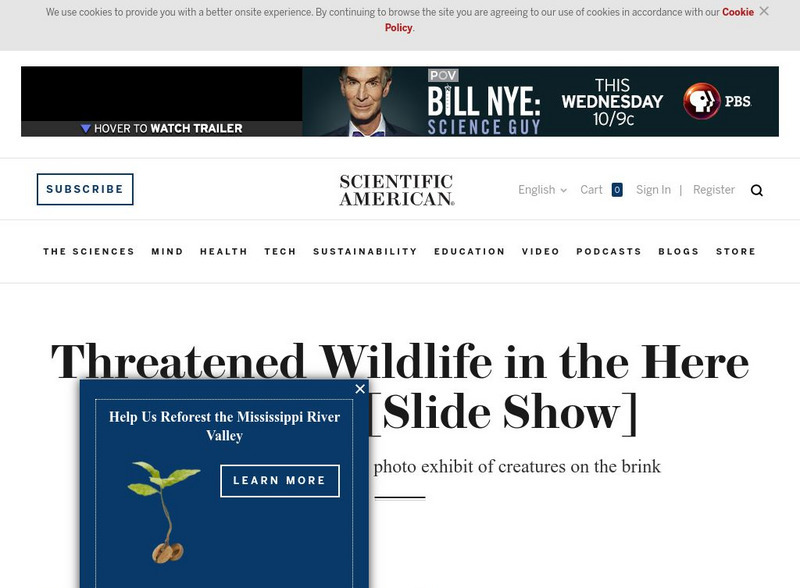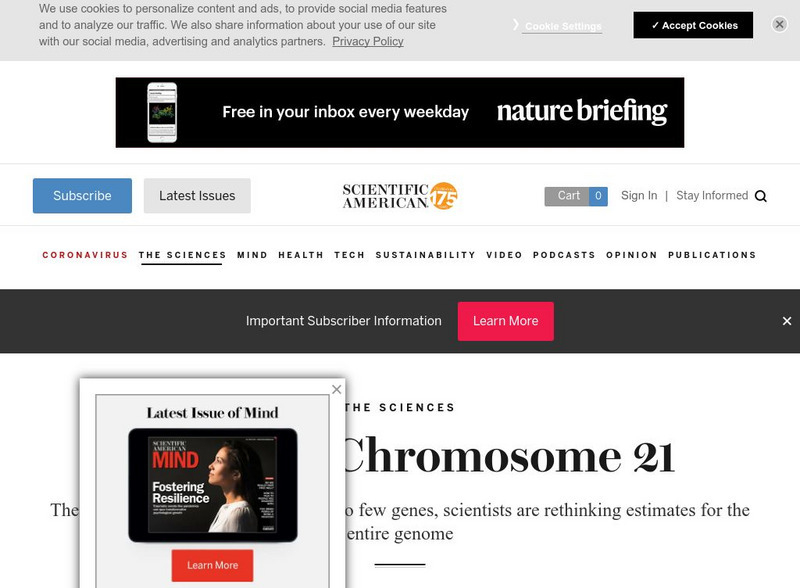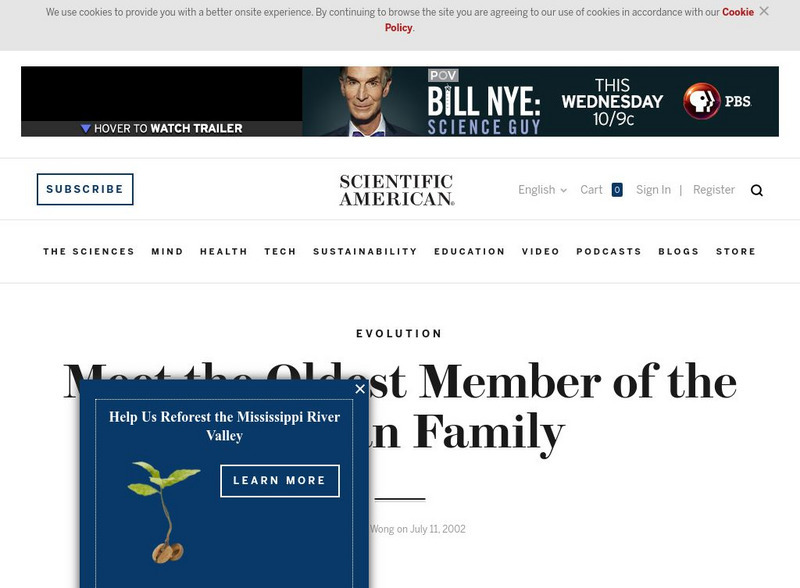Scientific American
Life-Sized Drawing
Ocean explorers or mathematicians research the wreck of the CSS H.L. Hunley. They investigate the actual dimensions of the Hunley using math and measuring skills. Afterward, they sketch a large scale drawing of the submarine outdoors on...
Scientific American
Inside the Coronavirus
Take biologists on a journey into the heart of the Covid-19 virus with a series of stunning graphics and explanations about the global pandemic. Animations bring investigators up close to the virus, revealing its structure and movement...
Scientific American
Scientific American: Happy 200th Birthday Charles Darwin: In Depth Reports
Explore the thinking of Charles Darwin, and read how his theory of evolution survives, thrives, and shapes the way we learn about nature. (February 2009)
Scientific American
Scientific American: It's Back! Total Solar Eclipse Hits Skies
Discover information about the solar eclipse of the moon cutting between the Earth and the Sun in July 2008. [July 2008]
Scientific American
Sci Am: Search for Extraterrestrial Intelligence
Carl Sagan and Frank Drake make a case for exploring space to discover extraterrestrial intelligence.
Scientific American
Scientific American: Cause of Werner Syndrome & Progeria
This "Ask the Experts" article answers the question, "What do we know about the cause of Werner syndrome and progeria, the disease that leads to premature aging in children?" This article also distinguishes between Hutchinson-Gilford...
Scientific American
Scientific American: What Is an Exothermic Reaction
Scientific American magazine, in the person of Dr. Gerald R. Van Hecke, gives a wonderfully complete answer to this question. Complete with very many hot words for additional background. And a wonderful NASA launch photo.
Scientific American
Scientific American: What's a Dvd and How Does It Work?
This "Ask the Expert" article answers the question "What's a DVD and how does it work?" clearly and thoroughly. Compares the DVD to other data storage units, and to itself! Did you know there are more types of DVDs other than what you...
Scientific American
Scientific American: Aids Today and Tomorrow: In Depth Reports
A collection of Scientific American articles from 2008 on the topic of AIDS.
Scientific American
Scientific American: A Field Guide to Bats : In Depth Reports
Uncover the evolutionary past of the mysterious bats. Find out about their amazing ability to use sonar, the threat of rabies they carry, and conservation efforts to save the species.
Scientific American
Scientific American: The Science of Beauty: In Depth Reports
Scientific news and magazine articles from 2001-2009 related to the science behind beauty products and treatments.
Scientific American
Scientific American Slideshow: A Grain of Sand: Nature's Secret Wonder
Get an up-close microscopic view of grains of sand from various locations around the world in this slideshow from Scientific American.
Scientific American
Newfound Source of Mysterious Cosmic Bursts Poses Deeper Enigmas
Despite a breakthrough discovery by radio astronomers, the decade-long puzzle of elusive "fast radio bursts" is far from being solved. Scientific American investigates the story of the new cosmic breakthrough.
Scientific American
Scientific American Slideshow: Threatened Wildlife in the Here and Now
Learn about species that are presently facing endangered status in North America as climate change affects each in different ways in this slideshow from Scientific American.
Scientific American
Scientific American: 50 Years Ago: A Witness at the Scopes Trial
A lengthy article from Scientific American recounting the expert testimony of Fay-Cole Cooper, a professor at the University of Chicago, who supported the idea of evolution in the Scopes Monkey Trial.
Scientific American
Scientific American: Mapping Chromosome 21
This site has all kinds of information about current events on the decoding of the human genome, and specifically chromosome 21. This research will be helpful in identifying the root of common Down Syndrome complications.
Scientific American
Scientific American: Oldest Member of the Human Family
This article, published by Scientific American (July 11, 2002), highlights the discovery of a nearly complete skull of the oldest and most primitive member of the human family known yet. This fossil, found in central Africa, contains a...
Scientific American
Scientific American: Ribosomes Revealed
An update on ribosomes research at the molecular level. This site also provides links to various scientists. (9/99)
Scientific American
Scientific American: Scoring With Buckyballs
Buckyballs and nanotubes, two types of fullerenes, are being examined for potential in nanotechnology and nanoengineering.
Scientific American
Scientific American: Study Questions Wisdom of Harvesting Only the Largest Fish
This article, published by Scientific American (July 9, 2002), highlights a new study which questions the wisdom of harvesting only the largest fish. This "selective extraction" may be causing wild fish to shrink over time.
Scientific American
Scientific American: The Buzz on Bees: In Depth Reports
Read this multimedia article about the disappearance of bee colonies worldwide. Find out why it is crucial to saving this important pollinator from extinction.
Scientific American
Scientific American: Scratch 'N Sniff: A Guide to Cats and Dogs: In Depth Report
Explore this report on the science of our very own pets, and sometimes our best friends, the cats and dogs. (June, 2009)
Scientific American
Scientific American Slideshow: No Two Alike: Snowflake Photography
See a variety of beautiful snowflake images demonstrating how each one is different in this slideshow from Scientific American.
Scientific American
Scientific American: Dogs Process Language Like Us, but What Do They Understand?
Can dogs actually understand what people say to them? Is it the tone or the words they process?



